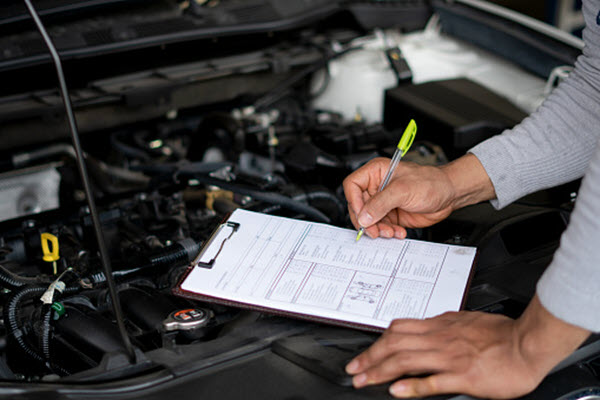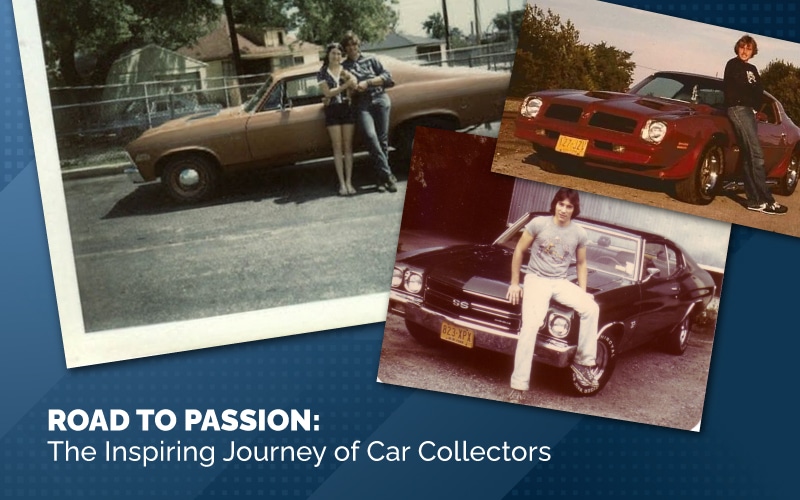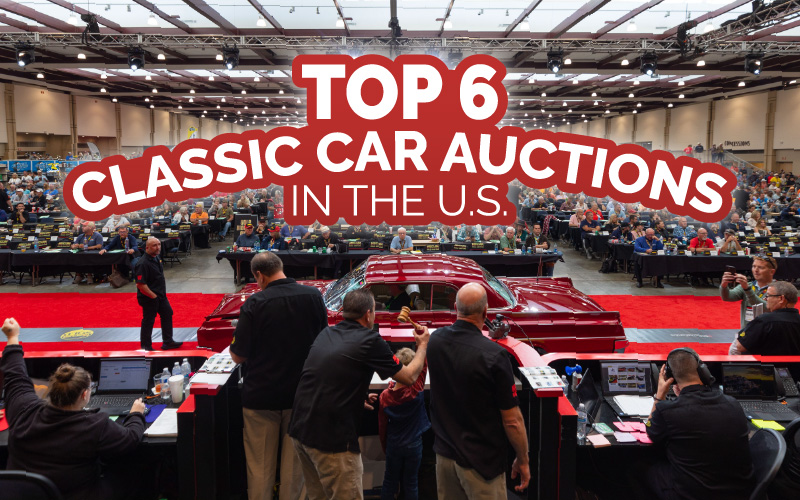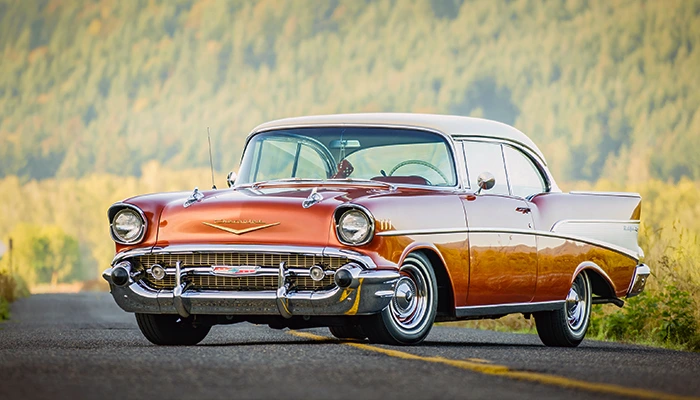Classic Car Inspections: What You Need to Know Before Buying
Before you purchase a classic car, it is a good idea to get it inspected by a mechanic. You should not settle for a short test-drive before deciding if a classic car is the right fit for you. Pre-purchase classic car inspections allow you to get a deeper understanding of how your car runs and what problems may need fixing.
In this guide, we’ll go over everything you need to examine before purchasing a new collector car.
What Is A Pre-Purchase Inspection?
A pre-purchase inspection is a professional vehicle inspection in which the entire vehicle is thoroughly checked for evidence of mechanical, structural, or cosmetic damage before it’s purchased. This detailed report can help you determine if the car being inspected is worth the investment you are going to put in it. The licensed mechanic or technician will help determine whether the vehicle is suitable for sale throughout the inspection process. This can potentially save you thousands of dollars by preventing you from buying a damaged car.
A pre-purchase car inspection is an investment that can pay off in the short-term as well. If a mechanic informs you of existing mechanical problems under the hood, you can use those issues to negotiate a better purchasing price from the owner.
More than anything, a classic car pre-purchase inspection offers buyers peace of mind. This is especially important if you are financing a classic car. Unless you’re an automotive expert, chances are you might miss something. By receiving a second opinion from an experienced mechanic, you can find out whether the vehicle you’re buying is worth its asking price.
Where Can I Get A Pre-Purchase Car Inspection?
You can get an objective, pre-purchase inspection from a neutral party by searching “pre-purchase inspection near me” and sorting through the various reputable (i.e., with many legitimate positive reviews) garages and mechanics.
If you’re purchasing the vehicle from a dealership, they will be able to conduct the inspection on the spot. However, a dealership may experience a conflict of interest between providing complete information about the vehicle condition and providing too much information which may endanger the potential sale of the car.
If you’re buying a car from a secondhand owner or vendor, take it to a trusted mechanic. Buyers who are unsure how to get a pre-purchase inspection can also order a pre-purchase inspection from the MotorTech Classic Car Network, AAG Auto Appraisal Group, or FossilCars.
What A Pre-Purchase Inspection Entails for Your Car
When you start looking around to purchase a classic vehicle, you need to ensure the car is up to your standard. Sometimes, used cars may not be in the proper condition to drive or may need additional maintenance after purchase. The best way to understand exactly how much time and work you’ll need to put into the used vehicle is to get a pre-purchase inspection. But, what exactly does that entail?
A pre-purchase “road ready” inspection should check the following:
- Body Panels
- Condition
- Tires
- Engine Compartment/Mechanicals
- Smell
Body Panels: What To Look For
When looking at the body panels of a vehicle for a pre-purchase inspection, you’ll want to look at the following:
- Check the exterior of the car by walking around it and noting any scratches, dents, discoloration, rust, or blemishes of any kind.
- Look out for gaps between panels looking for evidence of frame damage. Uneven gaps may be indicative of an accident repair.
- Assess condition of undercarriage including frame and sub-frames.
- Assess condition of under body including floor pans, trunk pan, rocker panels, etc.
- Examine for evidence of rust, collision or flood damage
- Assess fit, finish and condition of body panels and paint
Overall Condition: What To Look For
When looking at the overall condition of a vehicle for a pre-purchase inspection, you’ll want to look at the following:
- Evaluate condition of door panels, upholstery, carpets, consoles, seats, headliners, dashboards.
- Evaluate condition of trim, chrome, stainless steel, plastic, lenses, glass, and emblems
- Confirm presence of spare wheel, tools, accessories.
Tires: What To Look For
When looking at the tires on a vehicle for a pre-purchase inspection, you’ll want to look at the following:
- Take note of the condition of the tires, whether they are the same brand, or if they are bubbling or cracking on the sidewalls.
- Observe tread. There should be at least a one-third inch of tire tread left on classic car tires. If the tread is uneven, there may be a suspension issue.
Engine Compartment/Mechanicals: What To Look For To Look For
When looking at the engine compartment and mechanicals of a vehicle for a pre-purchase inspection, you’ll want to look at the following:
- Pop the hood and conduct a thorough pre-buy car inspection of the entire under-the-hood compartment.
- Check for signs of grease, leaks, coolant, and ensure that fluid levels are normal.
- Squeeze hoses to confirm that hoses don’t feel too hardened.
- Inspection / evaluation of overall condition of engine, drive-train, and brakes.
- Assess condition of suspension by noting whether vehicle sits level and bounce corners to identify potential suspension issues
- Verify proper operation of mechanical/electrical levers, lights, switches, accessories, and controls
- Road test drive (if possible) to identify potential steering, gear shifting, suspension, braking, engine operation, or exhaust system issues
Smell: What To Look For
When assessing the smell of a vehicle for a pre-purchase inspection, you’ll want to check the following:
- Check the interior of the car for a mold or mildew smell. If a classic car hasn’t been well looked after, it may show signs of water damage that are easily sniffed out.
- Make sure you double-check carpets for evidence of water damage, mildew or mold.
Frequently Asked Questions
What Does A Pre-Purchase Inspection Cost?
Pre-purchase car inspection services for a used car usually costs a few hundred dollars. However, these inspection reports can wind up saving you hundreds, if not thousands, of dollars in the long run. Making an informed decision on the purchase of a used car is incredibly important, especially when dealing with pricey classic and vintage models.
Where Can I Get A Pre-Purchase Inspection?
Pre-purchase car inspection services for a used car usually costs a few hundred dollars. However, these i
You can get an objective, pre-purchase inspection from a neutral party by searching “pre-purchase inspection near me” and sorting through the various reputable (i.e., with many legitimate positive reviews) garages and mechanics.
Additionally, if you purchase from a car dealership, they may be able to provide you with a pre-purchase inspection on the spot. However, a dealership may experience a conflict of interest between providing complete information about the vehicle condition and providing too much information which may endanger the potential sale of the car.
If you’re buying a car from a secondhand owner or vendor, take it to a trusted mechanic. Buyers who are unsure how to get a pre-purchase inspection can also order a pre-purchase inspection from the MotorTech Classic Car Network, AAG Auto Appraisal Group, or FossilCars.
Are Pre-Purchase Inspections Necessary to Insure My Classic Vehicle?
No, pre-purchase inspections are not necessary for you to insure your classic car. However, it is still a good idea to get one before making a final purchasing decision.
What Types of Vehicles Can Qualify For a Pre-Purchase Inspection?
Any vehicle you purchase can qualify for a pre-purchase inspection, whether it is a motorcycle or car.
Get High Quality Auto Insurance For Your Classic Car
When you finally purchase your dream car, you’re going to want to do everything in your power to take care of it. Whether that means getting a pre-purchase inspection from a mechanic you trust, or finding a trustworthy company to insure your vehicle, American Collectors Insurance can help.
We love classic and vintage cars just as much as you do, so we want to make sure they’re taken care of. You can talk to one of our collector specialists to get a free quote built around your needs.



